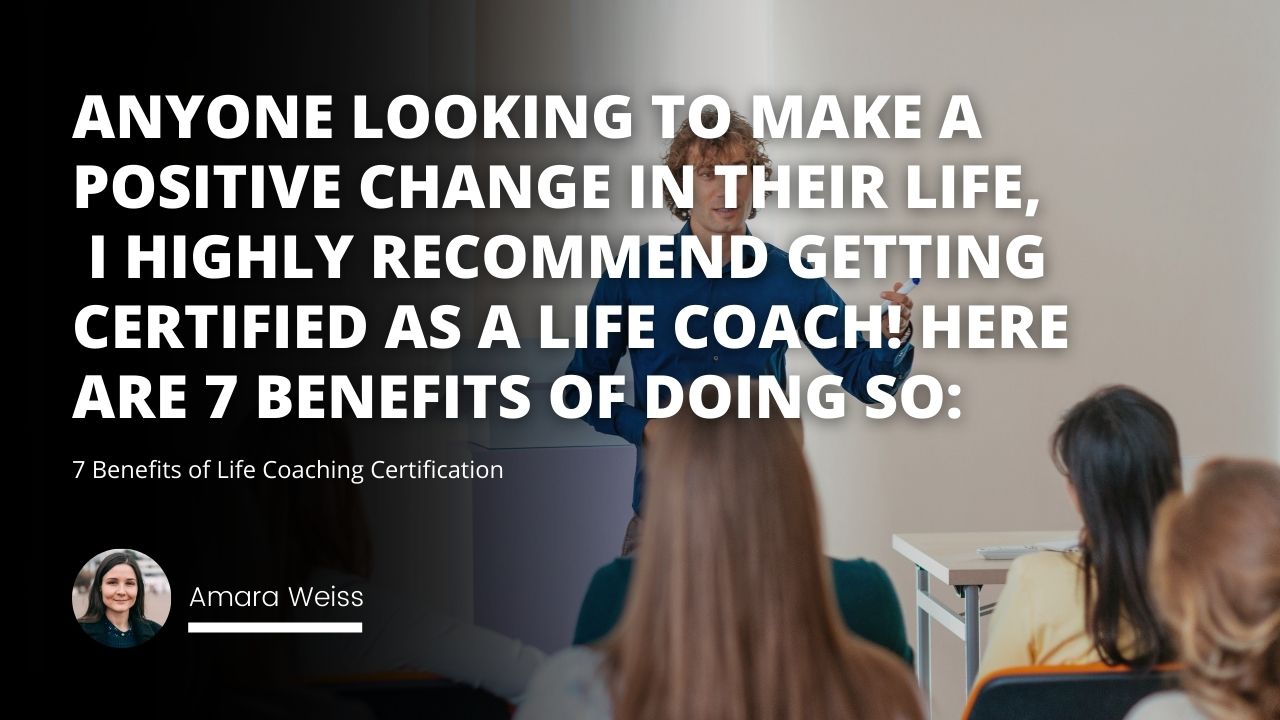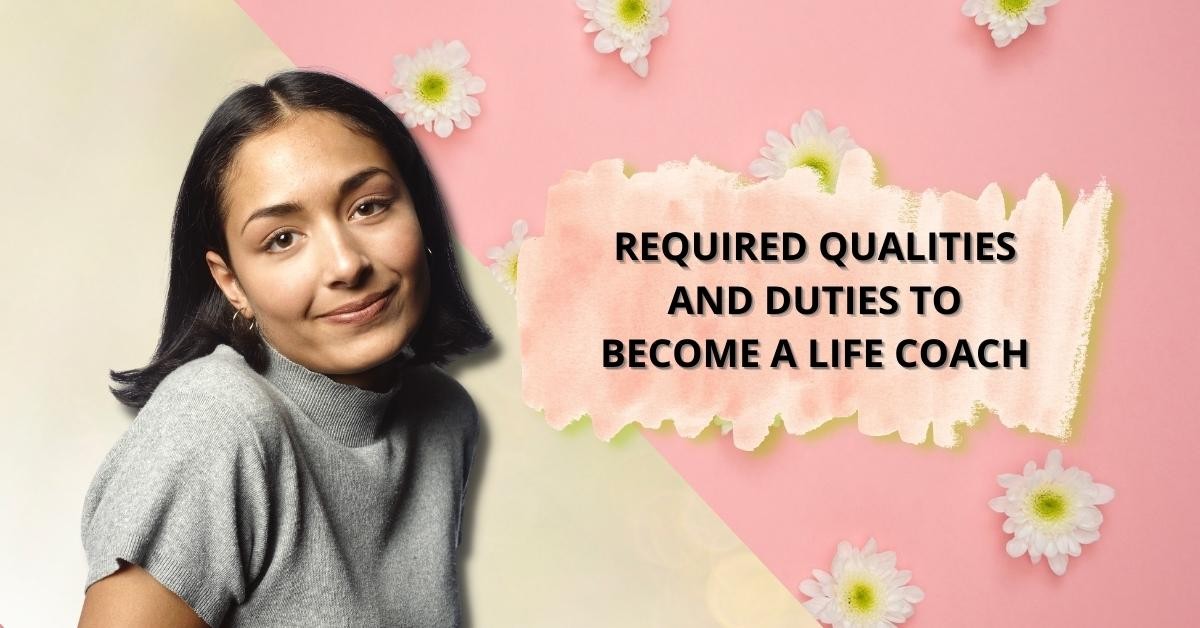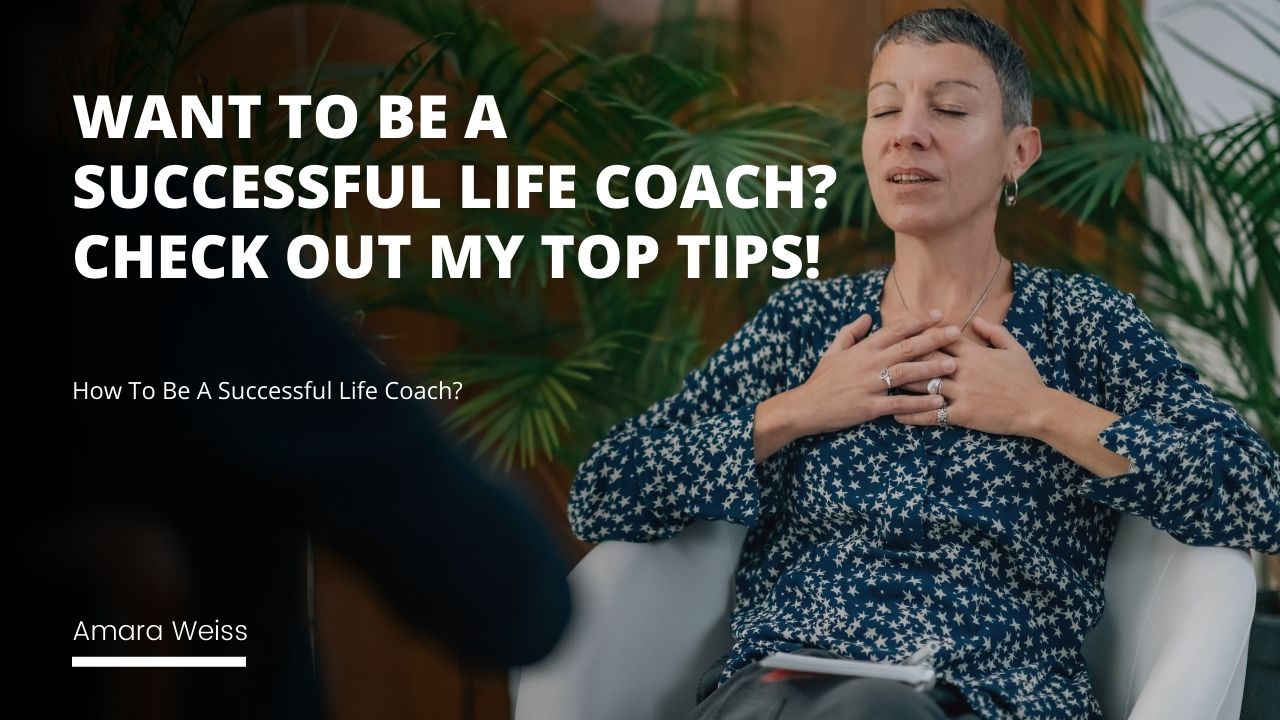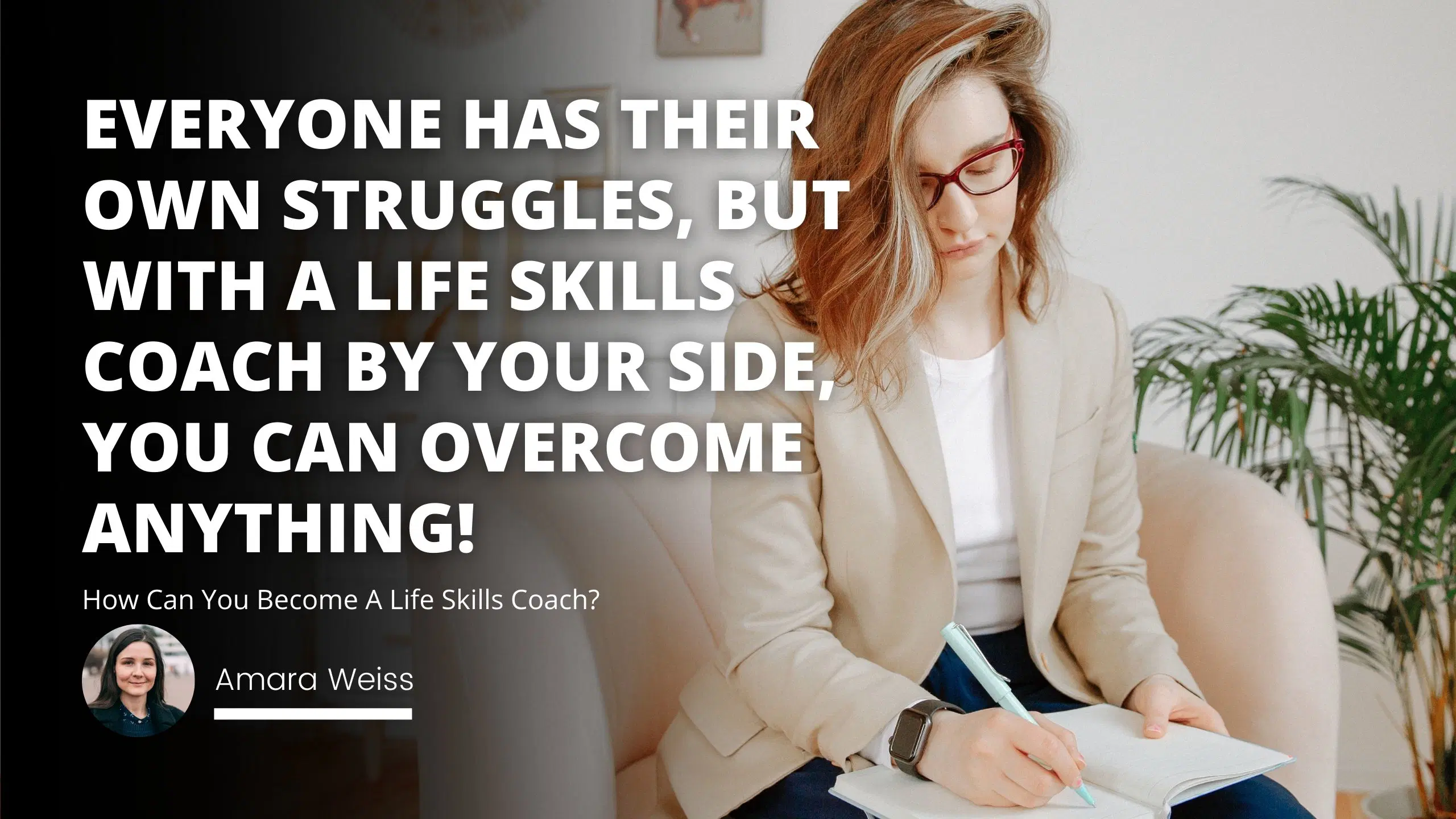
If you're looking to help others develop important life skills, then becoming a life skills coach may be the perfect career for you. Life skills coaches work with individuals or groups to help them improve their time management, communication, and other important skills.
Related Course: Time Management Course Free
Becoming a life skills coach requires both personal and professional development. Many life coaches have years of experience in social work, communication, or other related fields. However, you don't necessarily need a formal background to become a life coach. Instead, it's important that you have strong interpersonal skills and a genuine desire to help others.
If you're interested in becoming a life skills coach, there are a few things you can do to get started. First, consider taking some personal development courses or attending workshops on coaching. This will give you the basic skills and knowledge you need to be an effective coach.
Additionally, it's helpful to find a mentor who is already a successful life coach. This person can provide guidance and support as you get started in your new career.
Finally, remember that becoming a life skills coach is a lifelong journey. As you gain experience, you'll continue to develop your skills and knowledge. There are always new techniques and approaches to learn, so keep an open mind and be willing to continue growing as a coach.
What is a life skills coach and what do they do?
A life skills coach is someone who helps individuals or groups improve their time management, communication, and other important skills. Life coaches typically have experience in social work, communication, or other related fields.
They use their skills and knowledge to help others reach their personal and professional goals. What personal and professional qualities do you need to be a successful life coach
In order to be a successful life coach, you need strong interpersonal skills and a genuine desire to help others. Additionally, it's helpful to have some formal training in coaching or related fields. However, the most important thing is that you're passionate about helping others reach their potential. What are some things you can do to get started as a life coach?
If you're interested in becoming a life coach, there are a few things you can do to get started.
First, consider taking some personal development courses or attending workshops on coaching. This will give you the basic skills and knowledge you need to be an effective coach. Additionally, it's helpful to find a mentor who is already a successful life coach. This person can provide guidance and support as you get started in your new career.
Finally, remember that becoming a life skills coach is a lifelong journey. As you gain experience, you'll continue to develop your skills and knowledge. There are always new techniques and approaches to learn, so keep an open mind and be willing to continue growing as a coach.
How can you become a life skills coach yourself, if you're not already one?
If you want to become a life skills coach, there are a few things you can do to get started. First, consider taking some personal development courses or attending workshops on coaching. This will give you the basic skills and knowledge you need to be an effective coach.
Additionally, it's helpful to find a mentor who is already a successful life coach. This person can provide guidance and support as you get started in your new career.
Finally, remember that becoming a life skills coach is a lifelong journey. As you gain experience, you'll continue to develop your skills and knowledge. There are always new techniques and approaches to learn, so keep an open mind and be willing to continue growing as a coach.
What type of person would be the best fit for this career path and why?
The best type of person for this career path would be someone with strong interpersonal skills and a genuine desire to help others. Additionally, it's helpful to have some formal training in coaching or related fields.
However, the most important thing is that you're passionate about helping others reach their potential. If you have these qualities, you'll be well on your way to becoming a successful life coach.
The benefits of becoming a life skills coach
There are many benefits to becoming a life skills coach. As a coach, you'll have the opportunity to help others improve their time management, communication, and other important skills. You'll also be able to use your skills and knowledge to help others reach their personal and professional goals.
Additionally, being a life coach is a great way to continuously learn and grow as a professional. If you're passionate about helping others reach their potential, then becoming a life coach may be the perfect career for you.
Some tips to get started on your journey to becoming a life skills coach!
If you're interested in becoming a life skills coach, there are a few things you can do to get started. First, consider taking some personal development courses or attending workshops on coaching. This will give you the basic skills and knowledge you need to be an effective coach.
Additionally, it's helpful to find a mentor who is already a successful life coach. This person can provide guidance and support as you get started in your new career. Finally, remember that becoming a life skills coach is a lifelong journey. As you gain experience, you'll continue to develop your skills and knowledge.
There are always new techniques and approaches to learn, so keep an open mind and be willing to continue growing as a coach.
Becoming a life skills coach can be incredibly rewarding, both personally and professionally. If you’re interested in helping others reach their goals and improve their lives, this may be the perfect career for you!
Our join life coaching course can give you the training and certification you need to start helping people achieve success. With our help, you can become a life skills coach and make a difference in peoples’ lives. Ready to get started?
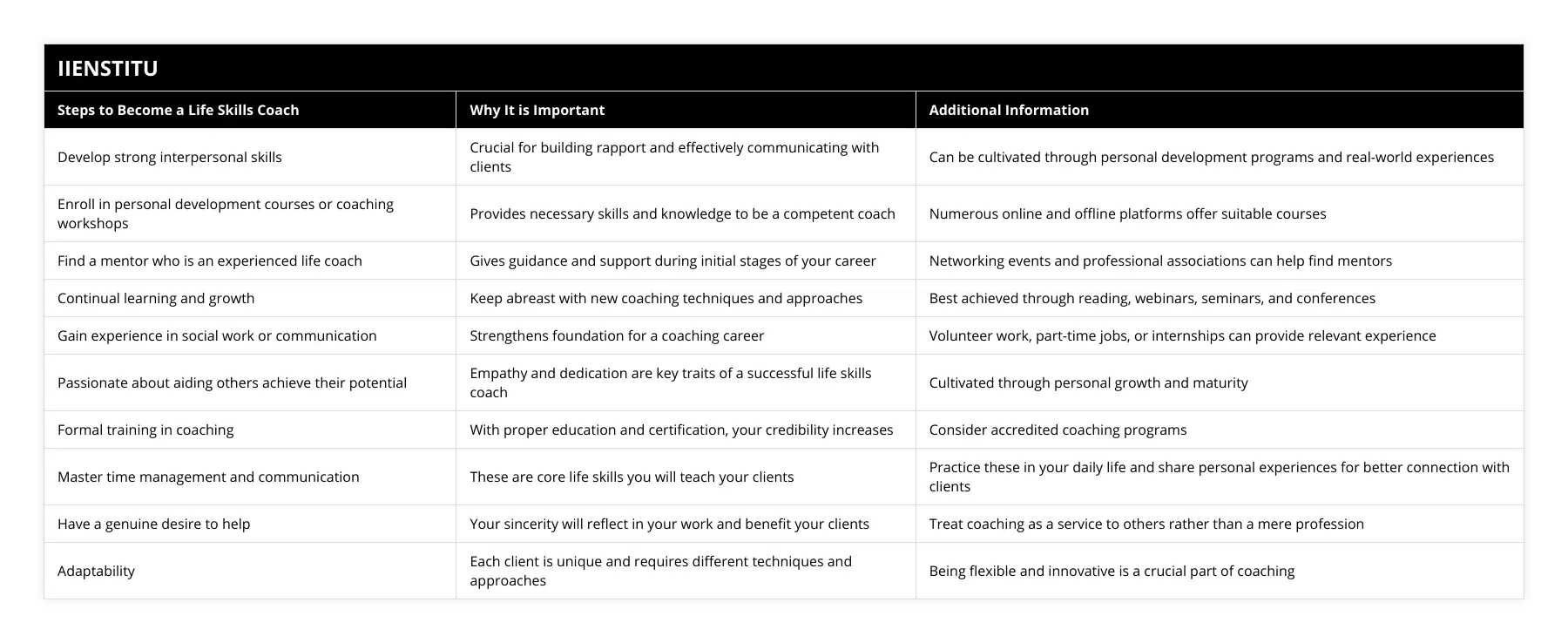
Frequently Asked Questions
What qualifications do I need to be a life coach?
Essential Qualifications for Life Coaching
Educational Background
To become a life coach, you do not require a specific educational background. However, it is beneficial to have a diploma or a degree in fields like psychology, counseling, or social work. These subjects provide a foundational understanding of the human mind and behavior, which can enhance your coaching abilities.
Certification and Training
While not always mandatory, obtaining a Life Coach Certification will increase your credibility and professional standing. Several organizations offer certification programs, such as the International Coach Federation (ICF) and the International Association of Coaching (IAC). Completing these programs helps ensure you have the necessary skills to deliver high-quality coaching services.
Experience and Skills
Life coaching often involves helping clients make significant changes in their lives, which demands strong interpersonal skills and excellent communication abilities. Having experience in mentoring, counseling or volunteer work can demonstrate your capacity to support and guide others. Additionally, possessing skills such as empathy, active listening, and problem-solving is critical for gaining trust and fostering lasting relationships with your clients.
Continued Professional Development
The field of life coaching continually evolves to incorporate new insights and best practices. Consequently, life coaches should invest in ongoing professional development to stay updated on industry developments and enhance their skills. Attending workshops, conferences, and online courses can support your growth as a coach and help you serve your clients more effectively.
In conclusion, the qualifications needed to be a life coach include a relevant educational background, certification and training, experience and skills, and a commitment to continued personal and professional development. These qualifications promote a strong foundation for a successful life coaching career and help ensure you provide the best possible support to your clients.
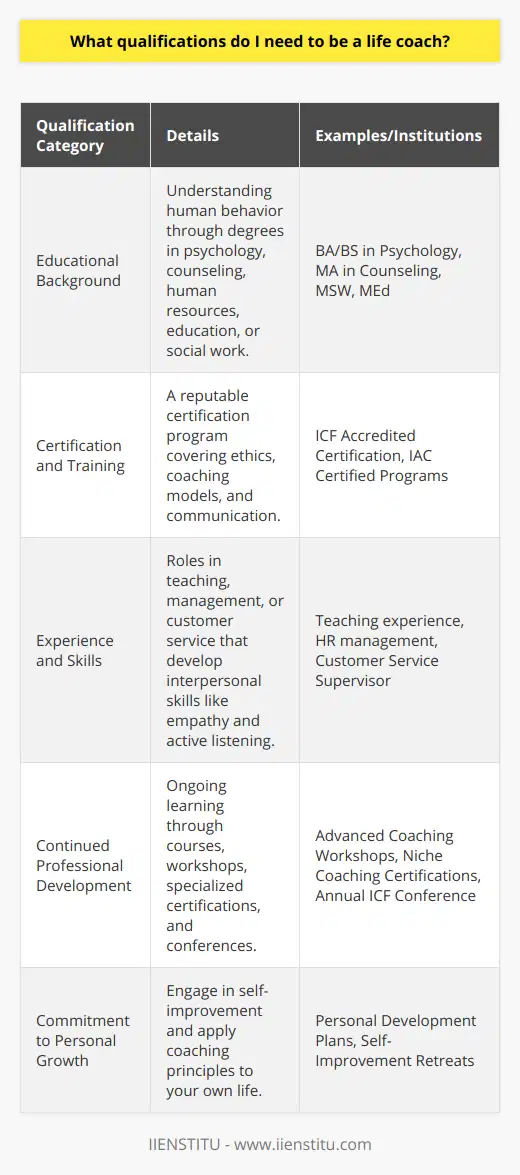
How do I start being a life coach?
Understanding the Profession
To begin the journey towards becoming a life coach, one must first understand the profession's purpose, which involves helping clients identify and achieve personal or professional goals through a thought-provoking and creative process. This client-centered approach requires excellent communication skills, empathy, and an understanding of human behavior.
Acquiring Relevant Skills
Aspiring life coaches must also work towards acquiring essential skills within the realm of personal development, such as time-management, goal-setting, and active listening. This can be achieved through seminars, workshops, or engaging with influential leaders in the field, such as Tony Robbins, Marie Forleo or Brene Brown.
Pursuing Education and Credentials
Pursuing a formal education, such as attaining a degree in psychology, social work, or counseling, can provide valuable insights into the human mind and behavior. Additionally, enrolling in a life coaching certification program accredited by the International Coach Federation (ICF) may increase credibility and help develop coaching techniques.
Gaining Experience
Experience plays a crucial role in developing as a life coach, whether through volunteering or paid work. Coaches-in-training should actively seek opportunities to practice their skills by offering coaching sessions to their friends, family members or local communities, as well as attend networking events to build professional connections.
Establishing a Niche Market
Specializing in a niche market can differentiate a life coach's offerings and make it easier to attract clients. Potential niches include career coaching, relationship coaching, health and wellness coaching, or spiritual coaching. Aspirants should identify their strengths, interests, and areas of expertise and align them with their chosen niche.
Marketing and Branding
Creating a unique brand identity and marketing oneself strategically is essential for success in the life coaching industry. This includes developing a compelling online presence through social media platforms, websites, and blogs, as well as investing in offline marketing efforts such as business cards and networking events.
Building a Client Base
Lastly, to begin a successful career as a life coach, it is necessary to build a strong client base through a variety of strategies such as offering free introductory sessions, collecting testimonials, running promotional campaigns, and tapping into their existing networks for referrals.
In summary, starting a career as a life coach requires a deep understanding of the profession, the development of necessary skills, formal education, and practical experience. Moreover, honing in on a niche market, establishing a unique brand, and building a strong client base are crucial elements for achieving success in this competitive industry.
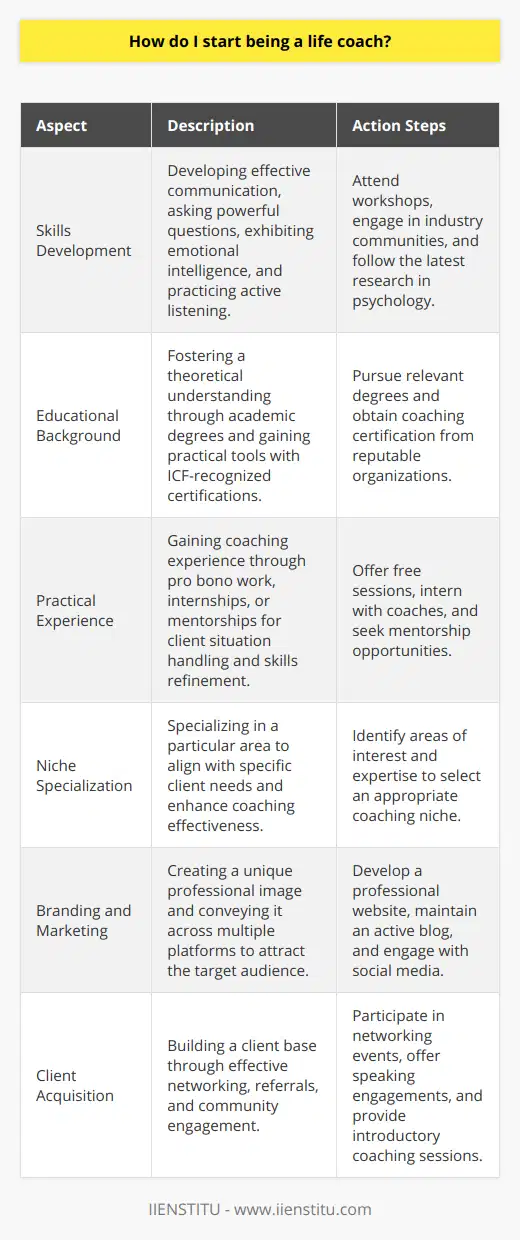
What is the role of a skills coach?
Role Identification
A skills coach plays a crucial role in the personal and professional growth of individuals by guiding and supporting them in developing and enhancing specific abilities. Their primary responsibility is to identify the strengths and weaknesses of their clients and strategically plan methods to improve their skill sets. By fostering a supportive and constructive relationship, a skills coach actively engages in facilitating meaningful learning experiences.
Goal Setting and Action Plans
One key function of a skills coach is to assist individuals in establishing clear, attainable goals and designing action plans to achieve those objectives. This process involves assessing a person's current skill level, understanding their aspirations, and identifying the most suitable path to achieve success. By breaking down ambitious goals into achievable steps, a skills coach ensures that individuals remain motivated and committed to their personal improvement.
Tailored Training and Feedback
A skills coach recognizes that each individual is unique, with distinct learning preferences and needs. They develop and employ customized training approaches to cater to these diverse requirements, continually adapting their coaching techniques to optimize results. In addition to providing personalized guidance, a skills coach offers constructive feedback on performance, enabling learners to identify areas for improvement and refine their skills.
Accountability and Support
To maintain momentum and ensure ongoing success, a skills coach instills a sense of accountability in their clients. By setting measurable benchmarks, a skills coach can objectively evaluate progress and address any potential obstacles hindering growth. Furthermore, they offer unwavering support and encouragement, fostering a conducive environment for individuals to overcome challenges and fulfill their full potential.
In conclusion, the role of a skills coach is pivotal in helping individuals achieve personal and professional success. They expertly assess, plan, and provide tailored guidance to address specific skill deficiencies, creating a supportive atmosphere that promotes growth and achievement. By holding individuals accountable and offering constant encouragement, a skills coach empowers their clients with the knowledge and confidence to realize their ambitions.
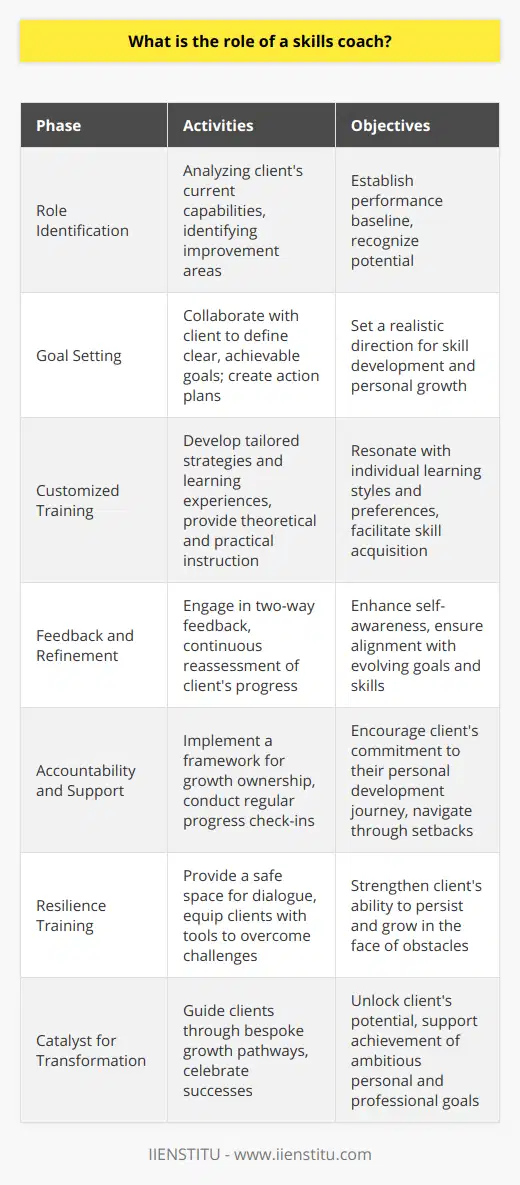
What is the typical process for a life coach to acquire new clients?
Establishing a Professional Presence
A life coach's journey to acquiring new clients typically begins with establishing a professional presence, both online and offline. This includes creating a well-designed website, showcasing their expertise and services, and maintaining an engaging blog.
Leveraging Social Media Platforms
Another key step in this process is utilizing social media platforms to connect with prospective clients. Life coaches often share their knowledge, achievements, and insights in a relatable and authentic manner, aiming to attract and engage potential clients through conversations and interactions.
Offering Free Sessions or Workshops
To establish trust with potential clients, life coaches may offer free coaching sessions or workshops. These sessions demonstrate their coaching style and allow both parties to determine if there is a good fit for ongoing collaboration. Furthermore, satisfied clients are more likely to provide referrals, creating a snowball effect for acquiring new clients.
Networking and Collaborations
Life coaches also attend networking events or collaborate with other professionals in the personal development field, such as therapists, authors, or speakers. These connections can lead to valuable collaborations, such as joint workshops or webinars, ultimately providing additional exposure and attracting more clients.
Building Client Testimonials
The collection and showcase of authentic client testimonials are crucial for a life coach seeking to gain new clients. By exhibiting positive feedback and success stories, potential clients are more likely to consider their services based on proven outcomes and results.
In Summary
In conclusion, the typical process for life coaches to acquire new clients comprises establishing a strong professional presence, leveraging social media engagement, offering free sessions or workshops, networking and collaborating with industry professionals, and showcasing client testimonials. These components work together to create trust, credibility, and authority in the life coach's area of expertise, ultimately making them more attractive to prospective clients.
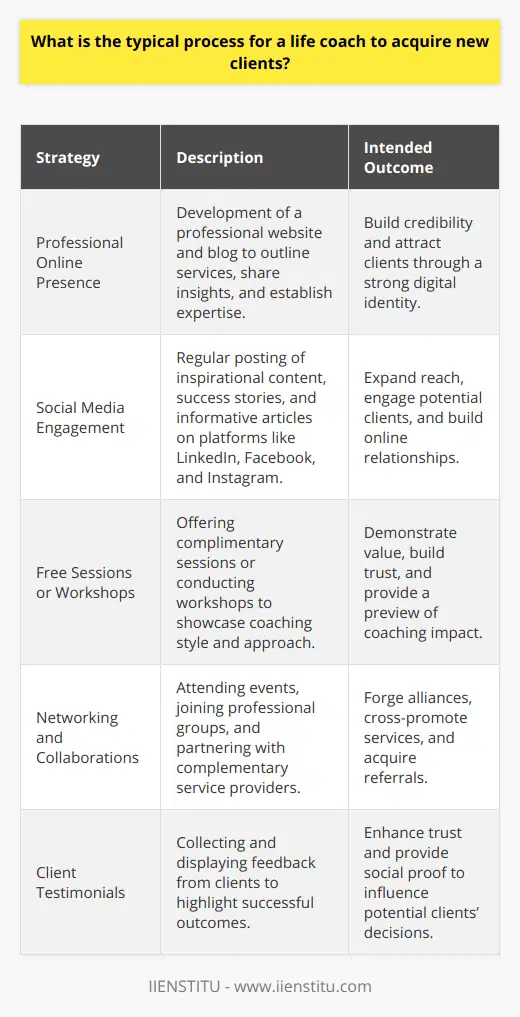
At what age would an individual be considered suitable to pursue a career as a life coach?
Age Considerations for Life Coaching
Determining an appropriate age for pursuing a career as a life coach is essential for guiding individuals on this path. Opinions vary on the ideal age to start a life coaching career, but several factors must be considered.
Experience and Maturity
Life coaches draw upon their past personal experiences and lessons learned to help clients navigate challenges and make decisions. As such, it is important for a life coach to have a certain level of personal growth and maturity. Generally, more time spent navigating life leads to increased wisdom and a wider range of experiences from which to draw. Therefore, older individuals may be better equipped to serve as life coaches.
Education and Training
While no formal age requirement exists for life coaching training programs, typically, students must possess a high school diploma or equivalent as a prerequisite. Most training programs can be completed within one or two years, which means an individual could feasibly pursue a life coaching career in their early twenties. However, it is important to consider the depth of knowledge and experience that younger life coaches may offer clients.
Market Perception
Clients seeking life coaching services may hold differing views on the age of their coach. Older clients may prefer coaches who are of similar age or older, while younger clients may appreciate the youthful perspective of a younger coach. Consideration of the target client demographic will play a role in gauging the ideal age for life coaches.
Conclusion
Ultimately, the suitable age for an individual to pursue a career as a life coach will vary based on experience, maturity, education, and market perception. While it may be possible to start as early as one's early twenties, the credibility and effectiveness of a life coach will depend primarily on the depth of their wisdom and experiences. It is important for prospective life coaches to assess their suitability for this profession based on these factors rather than focusing solely on age.
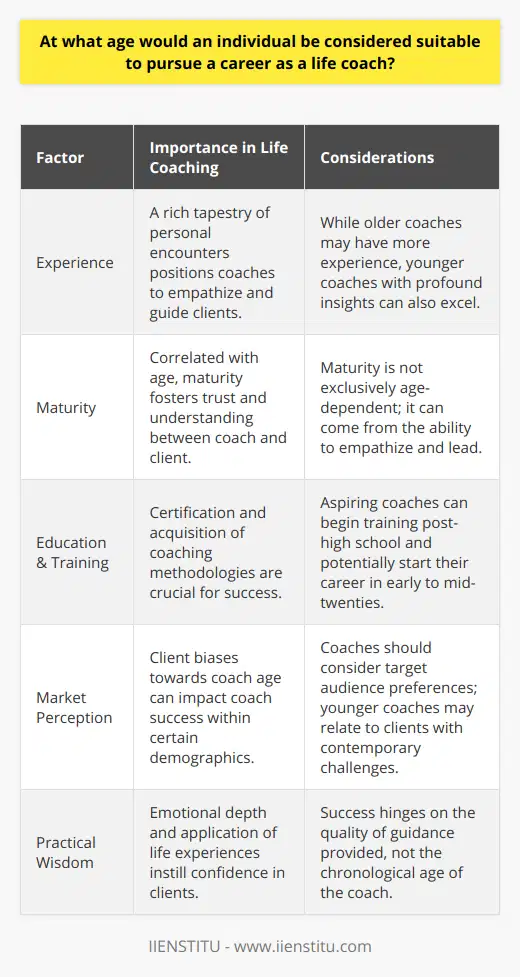
How does the role of a life skills coach differ from that of a traditional life coach?
Differences in Coaching Approaches
A life skills coach significantly differs from a traditional life coach in terms of their focus, methodology, and the scope of the issues they address. While both professionals aim to help clients improve their lives, the way they approach the process and the specific areas they target set them apart.
Focus on Practical Skills
Life skills coaches primarily concentrate on fostering the development of tangible, practical skills in individuals. Their goal is to enable clients to navigate real-life challenges more effectively by teaching essential life skills such as time management, budgeting, conflict resolution, and effective communication. In contrast, traditional life coaches often focus on assisting clients in identifying and pursuing broader life goals, such as career advancement, personal development, and overall well-being.
Structured Training
The methodology employed by life skills coaches typically involves more structured training and a step-by-step process of assessing, teaching, and reinforcing each critical skill. Techniques such as role-playing, case studies, and hands-on practice are commonly used to help clients internalize these skills effectively. On the other hand, traditional life coaching tends to utilize a more fluid approach, generating insights and strategies to achieve goals through introspection, reflection, and guided conversations.
Scope of Issues Addressed
Another significant distinction between life skills coaching and traditional life coaching is the diversity and depth of the issues they address. Life skills coaching tends to have a narrower scope, focusing on the acquisition and improvement of specific skills to tackle well-defined, everyday life challenges. Meanwhile, traditional life coaching adopts a more comprehensive and holistic approach, delving into various aspects of a person's life—from work to relationships to personal growth—encouraging systemic change for overall life improvement.
In conclusion, while both life skills coaches and traditional life coaches aim to help individuals enhance their lives, the former focuses on teaching practical skills and employs structured training methods to address well-defined problems. In contrast, the latter adopts a broader, more holistic approach to promote personal advancement and well-being. As such, the most suitable coaching for an individual depends on their specific needs, preferences, and desired outcomes.
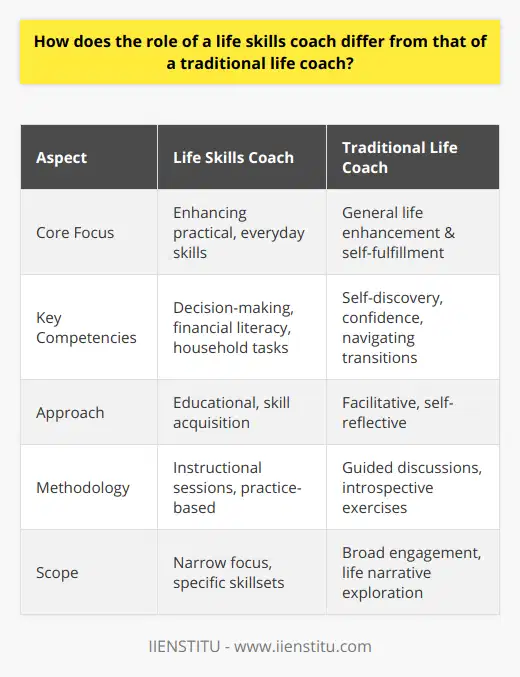
What is the difference between a life skills coach and a social skills coach?
Life Skills Coach vs Social Skills Coach
Definition and Focus
A life skills coach primarily focuses on the development of essential skills necessary for an individual's overall personal and professional growth. These skills encompass various aspects such as decision making, problem solving, time management, financial literacy, and goal setting. In contrast, a social skills coach aims to enhance interpersonal communication and promote healthier relationships among individuals by targeting specific areas like active listening, empathy, assertiveness, conflict resolution, and nonverbal communication.
Methods of Coaching
While both life and social skills coaches utilize teaching and mentoring approaches, their methods may differ in terms of content and techniques. Life skills coaches might adopt a holistic approach, addressing multiple aspects of a client's life and needs, often using goal-oriented and action-based strategies. On the other hand, social skills coaches may employ a more focused approach, concentrating on behavioral modification, role-playing scenarios, and providing clients with practical tools to improve social interactions.
Clientele
Life skills coaching caters to a broader range of individuals, including individuals struggling with daily life challenges, personal growth, and career development. Meanwhile, social skills coaching targets individuals who experience difficulties in social settings, such as people with social anxiety or those on the autism spectrum, to enhance their ability to form connections, develop friendships, and interact effectively in various social contexts.
Qualifications and Training
To become a life skills and a social skills coach, a coach might require different qualifications and training backgrounds. Life skills coaches may have certifications from life coaching organizations or hold degrees in fields such as psychology, counseling, or education. Social skills coaches, on the other hand, may have more specialized training, focusing specifically on therapeutic interventions to address social and communication difficulties or pursuing certifications from specialized organizations.
Conclusion
In summary, the main difference between a life skills coach and a social skills coach lies in their focus, coaching methods, clientele, and qualifications. Like skills coaching tends to address broader aspects of an individual's life, while social skills coaching focuses more specifically on interpersonal relationships and effective communication. By understanding these distinctions, individuals can make informed decisions when seeking coaching services tailored to their specific growth and development needs.
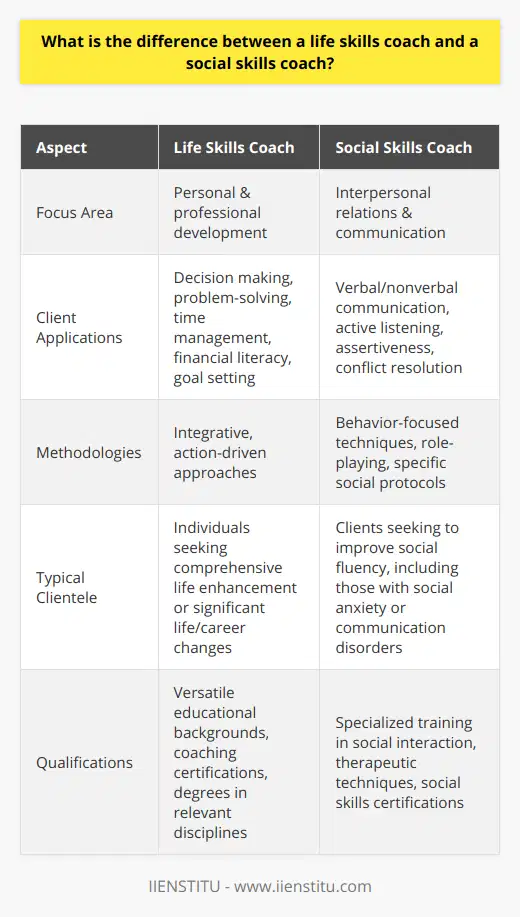
How does one transition from a traditional coaching role to specializing in life skills coaching?
Understanding the Difference
To transition from a traditional coaching role to specializing in life skills coaching, one must first understand the key differences between the two fields. Traditional coaching typically focuses on specific areas or competencies, such as sports, career, or academic-related concerns, whereas life skills coaching targets an individual's holistic well-being and personal development.
Embracing a Holistic Approach
Life skills coaching requires adopting a holistic approach that considers all aspects of an individual's life, such as their emotional, social, physical, and mental well-being. This involves guiding clients towards identifying, managing, and enhancing their life skills, which may include communication, problem-solving, decision-making, stress management, and time management skills. This comprehensive approach is essential for helping clients navigate life's challenges and attain their desired goals or outcomes.
Developing Effective Listening Skills
As a life skills coach, it is critical to develop effective active listening skills, as this will allow you to better understand, empathize, and support your clients in achieving their personal growth objectives. By actively listening to your clients, you can more accurately assess their needs and provide the appropriate coaching techniques or strategies to facilitate their development.
Enhancing Communication Techniques
Effective communication is pivotal for life skills coaches, who must be able to clearly articulate their thoughts, ideas, and guidance in a way that resonates with clients. Developing strong communication techniques may include building rapport, using open-ended questions, and employing motivational interviewing strategies. These skills are especially important when addressing sensitive topics or dealing with clients who may be resistant to change.
Building a Coaching Toolbox
Successful life skills coaching relies on a diverse and adaptive toolbox of coaching techniques that can be tailored to suit the needs of individual clients. To build your coaching toolbox, it is crucial to continuously expand your knowledge and skills through professional development opportunities, such as attending workshops, conferences, or obtaining additional coaching certifications. In addition, having a strong understanding of coaching models, frameworks, and evidence-based practices will further enhance your effectiveness as a life skills coach.
Collaborating with Other Professionals
Lastly, in order to excel in life skills coaching, it is beneficial to collaborate with other professionals, such as therapists, nutritionists, or career counselors, to ensure a comprehensive support network for your clients. By developing strong professional relationships, you can enhance your ability to provide a multidimensional approach to life skills coaching that addresses all aspects of your clients' lives.
In conclusion, transitioning from a traditional coaching role to specializing in life skills coaching involves understanding the key differences between these fields, embracing a holistic approach, and continuously developing essential coaching skills. Implementing these strategies will enable you to effectively support your clients in achieving their personal growth and well-being goals.
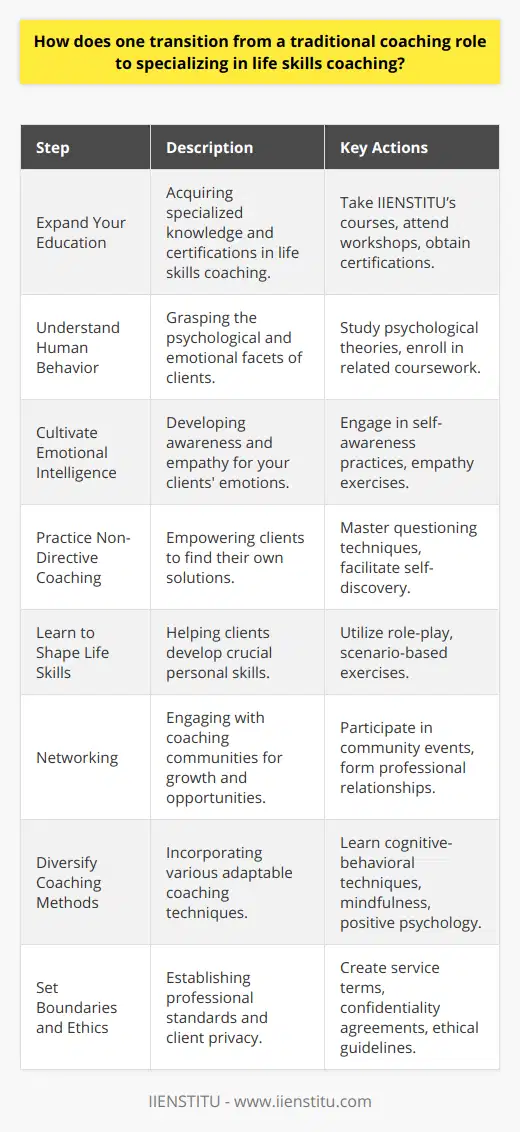
Are there specific age requirements or milestones that one should meet before pursuing a career as a life coach?
Age Requirements and Milestones for Life Coaches
Prior Education and Experience
When considering a career as a life coach, there are no specific age requirements or milestones that one needs to meet. However, certain prior education and experience can enhance a candidate's qualifications in the field. It is crucial for aspiring life coaches to possess a strong foundation in psychology, communication, and interpersonal skills, which typically come with time and experience.
Skill Development and Maturity
Although there is no specific age requirement for becoming a life coach, a certain level of maturity and emotional intelligence is necessary. Generally, people who have gained life experiences and faced various personal and professional challenges tend to possess greater emotional resilience and empathy. Thus, they are more equipped to guide others in navigating their lives effectively. These skills are essential for life coaches as they need to empathize with their clients, provide valuable insights, and offer practical solutions.
Certification and Professional Training
While no standard age requirement exists, obtaining proper certification and professional training is essential for aspiring life coaches. Many reputable organizations offer accredited life coach training programs that equip coaches with the necessary skills and knowledge. Most certification programs require candidates to complete a set number of training hours, pass examinations, and exhibit proficiency in core coaching competencies.
Building Network and Client Base
Regardless of age, successfully pursuing a career as a life coach requires building a strong network and client base. This involves connecting with professionals in related fields, attending workshops and conferences, and fostering long-term professional relationships. A well-established network enables life coaches to receive client referrals, share best practices, and stay up-to-date with industry trends.
In conclusion, while there are no explicit age-related milestones to become a life coach, individuals considering this career should focus on obtaining relevant education, experience, certification, and professional connections. By doing so, aspiring life coaches can ensure they are adequately prepared to guide clients towards leading more fulfilling and meaningful lives.
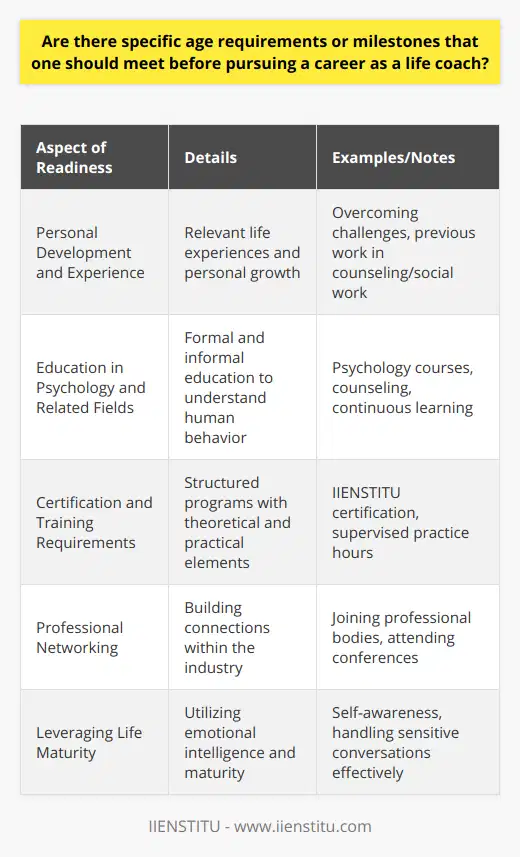
What is the difference between a life coach and a skills coach?
Defining Life Coaches and Skills Coaches
To differentiate between a life coach and a skills coach, one must first understand the primary goals and methods of each profession. Life coaching focuses on an individual's personal development, while skills coaching targets specific skill sets required to achieve success in professional or personal life.
Role of Life Coaches
Life coaching is a holistic, client-centered approach aimed at helping clients identify their life goals, values, and priorities. Life coaches empower their clients to achieve emotional, mental, and physical well-being, thus allowing them to reach their full potential. The key to a successful life coaching relationship lies in the coach's ability to facilitate growth and change through reflection, self-awareness, and strategic planning.
In contrast, skills coaching is more focused and outcome-driven. Skills coaches work with clients on developing or improving a particular skill set, often related to their professional aspirations. This could include improving their communication, leadership, problem-solving, or decision-making abilities, to name a few examples.
Methods Employed by Skills Coaches
Skills coaches employ various methods to help clients acquire or enhance specific abilities. Training sessions consist of practical exercises, role-playing activities, demonstrations, and feedback sessions designed to help clients master the chosen skill. Additionally, skills coaches may use diagnostic tools to assess clients' competencies and tailor their coaching approach accordingly.
Types of Clients and Areas of Expertise
Another notable difference between life coaches and skills coaches is the type of clients they work with and their areas of expertise. Life coaches cater to a wide range of clients, addressing diverse personal development needs, such as managing stress, enhancing relationships, or achieving work-life balance.
On the other hand, skills coaches are more prevalent in the corporate world, often working with high-ranking professionals such as executives and managers. The expertise of skills coaches may lie in areas like resilience, team building, and strategic thinking, among others.
Outcome Measurement
Lastly, the measurement of outcomes and success varies between life coaching and skills coaching. Life coaching successes are often evaluated based on clients' overall well-being and satisfaction with their life, making outcome measurement relatively subjective. In contrast, skills coaching outcomes can be quantified more easily by evaluating clients' performance improvements and progress toward achieving specific targets.
Conclusion
In essence, the primary difference between a life coach and a skills coach lies in their focus and goals. Life coaching encompasses overall personal growth and development, catering to clients' broader life objectives. Skills coaching, on the other hand, aims to develop specific competencies to help clients excel in their professional and personal lives. Both professionals play a crucial role in helping individuals grow, achieve their goals, and ultimately, reach their full potential.
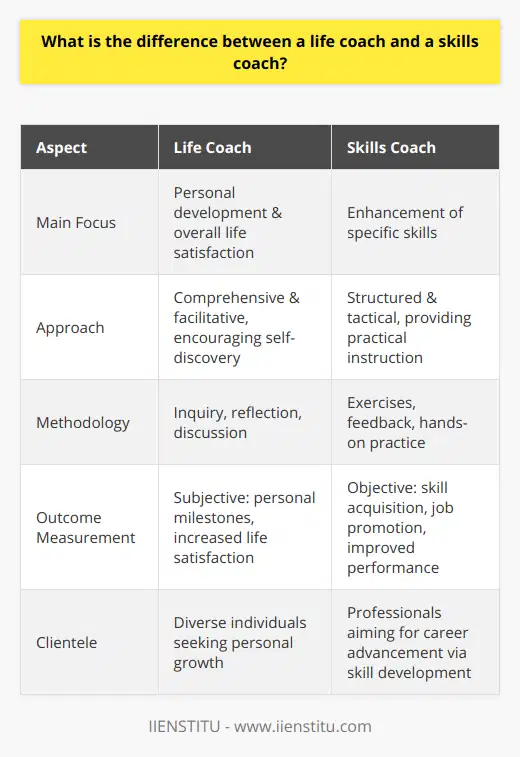
Do you need a license to be a life coach in PA?
Licensing Requirements in Pennsylvania
In the state of Pennsylvania, a specific license for life coaching is currently not required. However, professional life coaches should consider pursuing credentials or certifications to establish credibility and trust with clients.
Optional Certification and Credibility
Although not legally mandated, professional organizations such as the International Coach Federation (ICF) offer certification programs for life coaches. Obtaining certifications displays commitment to ethical standards and professional development within the field, potentially attracting more clientele.
Local Business Registration
While Pennsylvania does not require life coaches to hold a specific license, life coaches operating a business should comply with pertinent state and local regulations. Registering the business and obtaining any necessary permits or licenses is essential for legitimacy and legal compliance.
Liability and Ethical Considerations
Life coaches should also consider obtaining professional liability insurance to protect themselves in case of claims or lawsuits. Additionally, implementing a code of ethics when working with clients builds trust and establishes guidelines for maintaining professional relationships.
In conclusion, although life coaches in Pennsylvania are not required to hold a specific license, pursuing certification, registering a business, and considering liability and ethical aspects are important factors for establishing a reputable and successful life coaching practice.
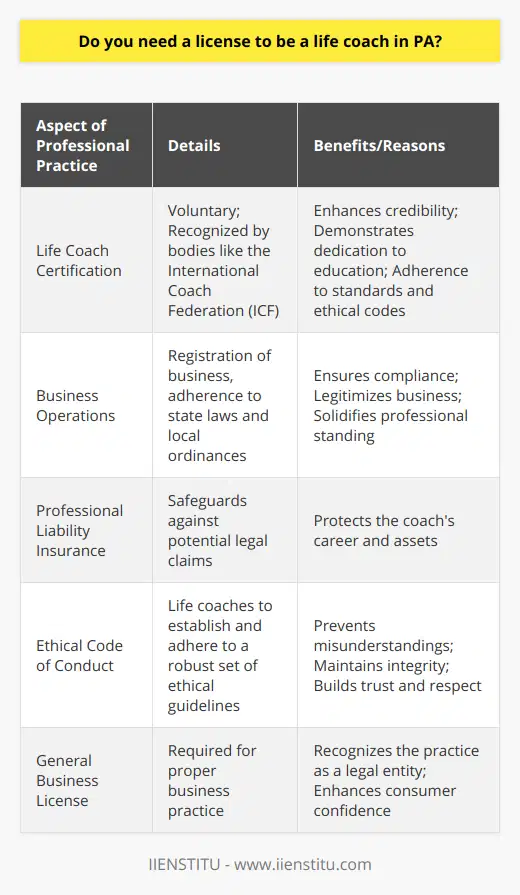
What is a life skills coach?
**Definition and Role**
A life skills coach is a professional who guides individuals in developing and enhancing essential skills required for personal and professional growth. They act as a catalyst for self-improvement, assisting individuals in identifying and overcoming challenges that hinder their progress.
**Areas of Focus**
Life skills coaches focus on various aspects of life, including communication, problem-solving, decision-making, and emotional intelligence. They also guide clients on goal setting, time management, stress management, and interpersonal relationships.
**Methods and Techniques**
To assist individuals in developing life skills, coaches employ a variety of methods and techniques. Some common approaches include active listening, asking open-ended questions, providing constructive feedback, and employing motivational strategies. Such methods facilitate self-awareness and empower clients to achieve their desired outcomes.
**Importance of a Life Skills Coach**
Life skills coaches play a pivotal role in helping individuals acquire the necessary skills to navigate personal and professional situations effectively. By fostering personal growth and resilience, these coaches contribute to the mental and emotional well-being of their clients.
**Benefits of Life Skills Coaching**
Engaging with a life skills coach offers numerous benefits. These include improved decision-making abilities, enhanced communication skills, increased self-esteem, and better stress management. The coaching process fosters personal growth, leading to more fulfilling lives and improved overall well-being.
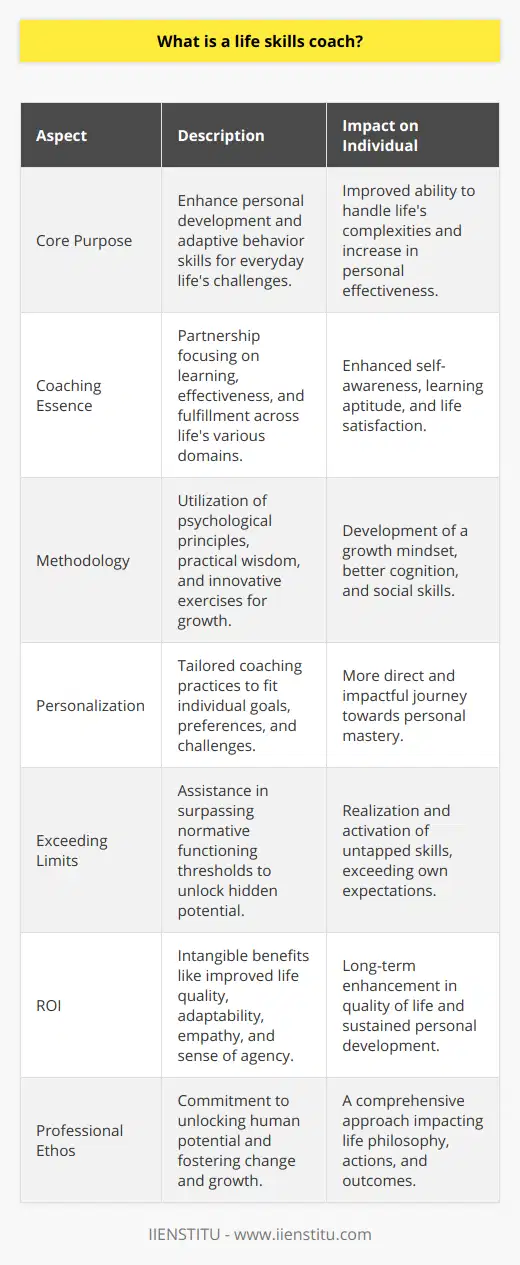
What credentials do you need to be a life coach?
Credentials for Life Coaching
To become a life coach, individuals typically pursue a combination of formal education, experience, and certification. Although there is no specific degree required, acquiring a bachelor's or master's degree in relevant fields such as psychology, business, or sociology can provide valuable knowledge and credibility. In addition, completing a life coaching education program accredited by the International Coach Federation (ICF) is vital to demonstrate competence in this field.
ICF Accreditation and Certification
The ICF is the most recognized and respected authority in the life coaching industry, promoting ethical coaching practices and setting industry standards. By obtaining a certification- Associate Certified Coach (ACC), Professional Certified Coach (PCC), or Master Certified Coach (MCC), aspiring life coaches demonstrate their skills and adherence to ICF core competencies. These certifications require the completion of an ICF-Accredited Coach Training Program (ACTP), and coaching experience ranging from 100 to 2,500 hours, depending on the desired certification level.
Continuing Education and Specialization
Developing further expertise through continuous education and training is essential for life coaches to keep up-to-date with current research, trends, and best practices. Pursuing specialized training in areas such as health and wellness, career development, or relationships can help coaches distinguish themselves and enhance their offerings to clients. Furthermore, joining professional associations and networks allows life coaches to connect with other professionals, share experiences, and gain access to industry-specific resources.
In conclusion, the credentials needed to become a life coach encompass a combination of formal education, ICF-certified training programs, coaching experience, and on-going professional development. By pursuing these qualifications, aspiring life coaches can ensure they have the skills and expertise to provide impactful coaching experiences for their clients.
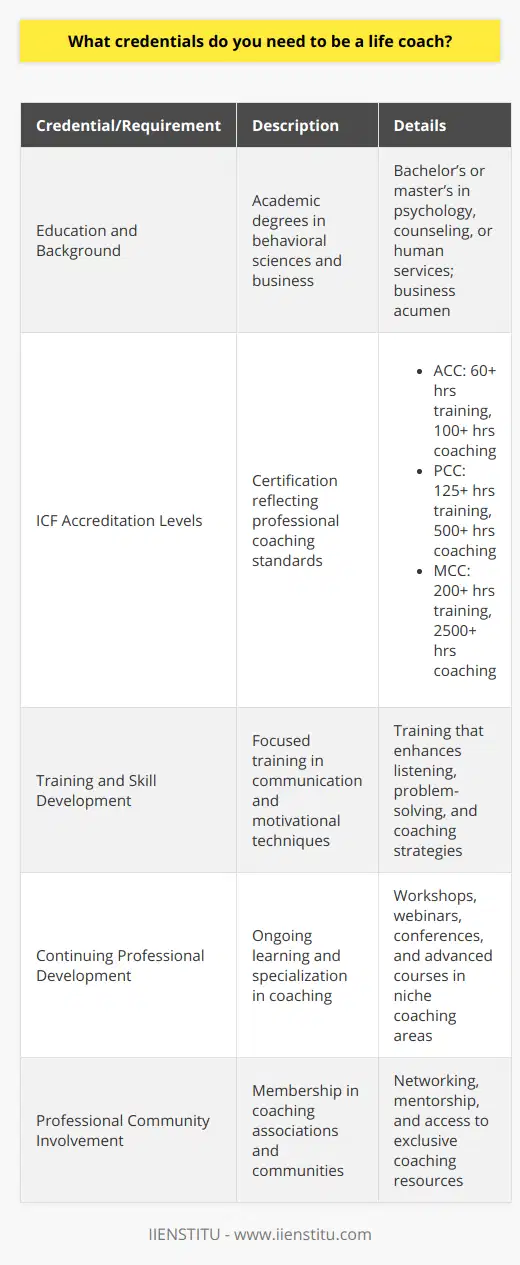
What does a life skills coach do?
Role of a Life Skills Coach
A life skills coach is a professional who assists individuals in achieving personal growth and improving various aspects of their lives. They work with clients to develop essential skills needed to navigate through life effectively, such as communication, problem-solving, decision-making, critical thinking, and interpersonal skills.
Setting Personal Goals
The first and foremost responsibility of a life skills coach is to help clients identify their personal goals and formulate a plan to reach those objectives. This process typically involves assessing their strengths and weaknesses, setting realistic expectations, and establishing a clear roadmap to achieve success.
Developing Effective Communication Skills
A life skills coach also emphasizes the importance of improving communication, which enables clients to express themselves confidently and persuasively. This includes active listening, empathy, and articulating thoughts and ideas in a comprehensible, non-confrontational manner.
Enhancing Problem-Solving and Decision-Making Abilities
Life skills coaches aid clients in enhancing their problem-solving and decision-making abilities, which are crucial for dealing with challenges and making sound choices. They teach techniques such as brainstorming, evaluating pros and cons, and weighing various options to arrive at logical, informed decisions.
Fostering Positive Interpersonal Relationships
Building healthy interpersonal relationships is another significant aspect of life skills coaching. By improving social skills, emotional intelligence, and conflict resolution skills, clients can create and maintain meaningful connections and successfully navigate personal and professional interactions.
Encouraging Personal Responsibility and Time-Management
A life skills coach encourages clients to take personal responsibility for their actions and create habits that lead to self-discipline, time-management, and stress reduction. This may involve setting and prioritizing tasks, effectively utilizing resources, and establishing routines that promote productivity.
Promoting Critical Thinking
Critical thinking is a crucial skill taught by life skills coaches, enabling clients to analytically evaluate situations and draw rational conclusions. This approach prevents hasty judgments and encourages objective assessments, ultimately fostering informed decisions and actions.
Supporting Emotional Well-Being
Finally, a life skills coach supports clients in managing stress, anxiety, and other emotional hurdles that may impede personal growth. By teaching relaxation techniques, mindfulness practices, and coping strategies, they empower clients to maintain a balanced state of mental health.
In conclusion, life skills coaches play a significant role in facilitating personal growth and enhancing various aspects of clients' lives, ranging from communication and problem-solving to interpersonal relationships and emotional well-being. Through valuable guidance and support, they enable individuals to lead more fulfilling and successful lives.
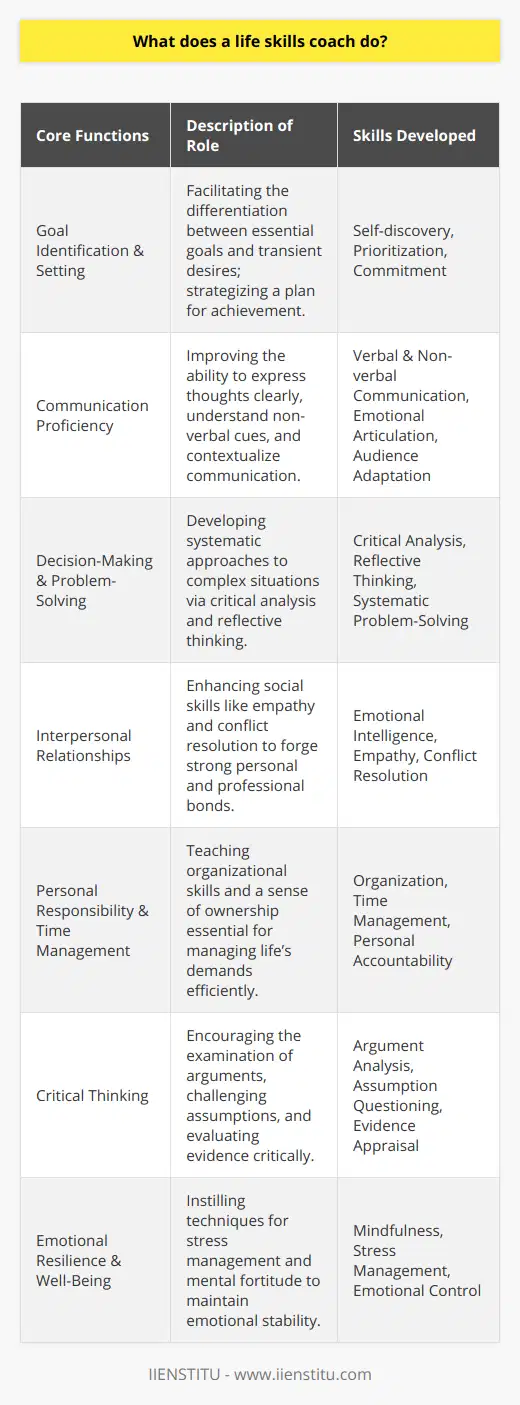
What is the difference between a life coach and a skills coach?
Understanding the Distinctions
To comprehend the differences between a life coach and a skills coach, it is necessary to examine the objectives and methodologies of each coaching type. In essence, a life coach focuses on broader life aspects, while a skills coach targets specific abilities and proficiencies.
Life Coaching: Holistic Personal Development
A life coach aims to help clients achieve their potential through holistic personal development. They evaluate and help improve various facets of a person's life, such as relationships, career, health, and overall happiness. Strategies employed by life coaches include setting goals, cultivating helpful habits, and overcoming personal challenges. Life coaches serve as guides, motivators, and accountability partners, aiding clients in reaching a balanced and fulfilling existence.
Skills Coaching: Mastery of Specific Abilities
In contrast, a skills coach primarily focuses on the development and improvement of specific abilities and proficiencies. Skills coaches can be found specializing in various fields, such as public speaking, sports, or professional skills. The objective of skills coaching is to help clients master these particular skills, thereby enhancing their performance in their chosen field. Skills coaches achieve this through targeted training, mentorship, and practical experience, helping their clients become proficient and confident in their chosen skill set.
Divergence in Approaches and Outcomes
The distinction between life coaching and skills coaching is not only evident in their goals and focus areas but also in the approaches and outcomes of each coaching type. While life coaching aims to create lasting improvements in various aspects of life, skills coaching seeks to sharpen specific skills and expertise. Furthermore, the results of life coaching can be seen as long-term enhancements in overall well-being, while the benefits of skills coaching manifest as immediate improvements in specific performance areas.
Selecting the Appropriate Coaching Style
In conclusion, the differences between a life coach and a skills coach revolve around their objectives, methodologies, and intended outcomes. Life coaches address the nuances of an individual's life as a whole, focusing on growth in various areas, while skills coaches concentrate on the improvement of specific abilities. As potential clients assess their coaching needs, understanding these differences can empower them to select the coaching style that best aligns with their unique goals and personal development journey.

